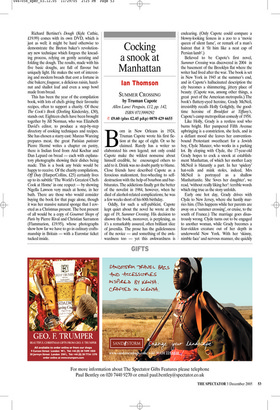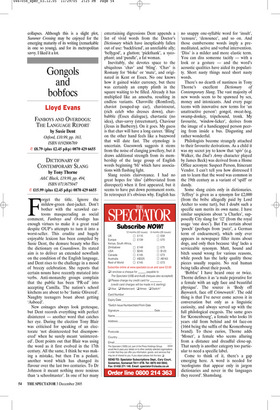Cocking a snook at Manhattan
Ian Thomson
SUMMER CROSSING by Truman Capote Allen Lane/ Penguin, £12, pp. 142, ISBN 0713999292 ✆ £9.60 (plus £2.45 p&p) 0870 429 6655 Born in New Orleans in 1924, Truman Capote wrote his first fiction at the age of eight. Or so he claimed. Rarely has a writer so elaborated his own legend; not only could Capote make the wildest nonsense about himself credible, he encouraged others to add to it. Drink was no doubt partly to blame. Close friends have described Capote as a ferocious malcontent, free-wheeling to selfdestruction with the help of bourbon and barbiturates. The addictions finally got the better of the novelist in 1984, however, when he died of alcohol-related complications; he was a few weeks short of his 60th birthday.
Oddly, for such a self-publicist, Capote kept quiet about the novel he wrote at the age of 19, Summer Crossing. His decision to disown the book, moreover, is perplexing, as it’s a remarkably assured, often brilliant slice of juvenilia. The prose has the guilelessness of the novice — and something of the awkwardness too — yet this awkwardness is endearing. (Only Capote could compare a blowsy-looking lioness in a zoo to a ‘movie queen of silent fame’, or remark of a man’s haircut that it ‘fit him like a neat cap of Persian lamb’.) Believed to be Capote’s first novel, Summer Crossing was discovered in 2004 in the basement of the Brooklyn flat where the writer had lived after the war. The book is set in New York in 1945 at the summer’s end, and in Capote’s hallucinated description the city becomes a shimmering, jittery place of beauty. (Capote was, among other things, a great poet of the American metropolis.) The book’s fluttery-eyed heroine, Grady McNeil, irresistibly recalls Holly Golightly, the goodtime heroine of Breakfast at Tiffany’s, Capote’s camp metropolitan comedy of 1958.
Like Holly, Grady is a restless soul who burns bright. Her pampered Fifth Avenue upbringing is a constriction, she feels, and in a defiant mood she leaves her conventionbound Protestant sweetheart for a Jewish boy, Clyde Manzer, who works in a parking lot. By eloping with Clyde, the 17-year-old Grady hopes to cock a snook at establishment Manhattan, of which her mother Lucy McNeil is blatantly a part. In her ‘spidery’ hat-veils and mink stoles, indeed, Mrs McNeil is portrayed as a shallow Manhattanite. She ‘loves her daughter’, we read, ‘without really liking her’: terrible words which ring true as the story unfolds.
Early one hot day, Grady drives with Clyde to New Jersey, where she hastily marries him. (This happens while her parents are away on a ‘summer crossing’, or cruise, to the south of France.) The marriage goes disastrously wrong. Clyde turns out to be engaged to another woman, while Grady becomes a fear-ridden creature out of her depth in underworld New York. With her ‘skinny, nimble face’ and nervous manner, she quickly collapses. Although this is a slight plot, Summer Crossing may be enjoyed for the emerging maturity of its writing (remarkable in one so young), and for its metropolitan savvy. I liked it a lot.




























































 Previous page
Previous page